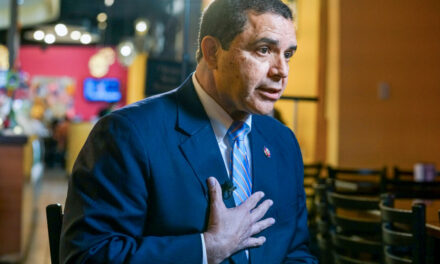We support our Publishers and Content Creators. You can view this story on their website by CLICKING HERE.
The complexities of the nation’s immigration crisis could complicate the process.
Two hearings on Capitol Hill on Dec. 10 offered a glimpse of the opposition that President-elect Donald Trump is likely to face as he seeks to fulfill his campaign promise of mass illegal immigrant deportations.
Trump’s stated plan to conduct “the largest deportation operation in American history” has divided Congress along party lines, as evident at the hearings.
In the House, career law enforcement officers testified before the House Homeland Security Committee about the national security and public safety threats posed by illegal immigration.
As Chapman and others spoke about the recent rise in illegal immigrant crime, members of the Senate Judiciary Committee held a hearing on the challenges and potential harms of mass deportations, for which Trump has suggested he might enlist military assistance.
Trump has said his administration will prioritize deporting those who pose security and safety threats, a plan that has received bipartisan support.
Family Separation
One of the witnesses testifying before the Senate was Foday Turay, an illegal immigrant initially from Sierra Leone who came to the United States at the age of 7.
Turay said he first learned of his immigration status when he tried to get a driver’s license.
“In 2012, I was thrown a lifeline when DACA was announced,” he said, referring to the Deferred Action for Childhood Arrivals program.
DACA, launched under the Obama administration, allowed certain individuals who came to the United States illegally as children to submit a renewable request for deferred removal as well as work authorization. In September 2023, a federal judge struck the program down as unlawful but allowed the so-called Dreamers who received their initial DACA status before July 16, 2021, to continue renewing that status.
Now an assistant district attorney in the Philadelphia District Attorney’s Office, Turay represents two different categories of illegal immigrants: “dreamers” and those from families of mixed immigration status.
“My deportation would hurt my own U.S.-citizen mother and my wife’s extended family, all of whom are United States citizens,” Turay said. He also noted that his son would be “left without a father” and his wife without a means of paying the mortgage.
The dilemma of family separation is an oft-cited complexity of the national immigration debate. Under Trump’s first presidential administration, the separation of illegal immigrant families at the border sparked enough controversy that the policy was nixed.
Appearing on NBC News’s “Meet the Press” for an interview that aired on Dec. 8, the president-elect was asked how he plans to handle the issue the second time around.
“We don’t have to separate families,” Trump said. “We’ll send the whole family, very humanely, back to the country where they came [from]. That way, the family’s not separated.”
In the case of mixed-status families, “then the family has a choice,” he said. “The person that came in illegally can go out, or they can all go out together.”
Trump added that he didn’t want to deport anyone but that “we have to because otherwise we have no country.”
When asked about his plans for DACA, the president-elect said he was open to working with Democrats to find a solution that would allow the program’s participants to stay in the country.
Durbin said he was encouraged by that offer.
“I accept the challenge,” Durbin said. “Name a time and place, Mr. President. I’ll be there.”
Costs, Logistics
In the House, David Bier, director of immigration studies at the CATO Institute, testified about another potential challenge to Trump’s deportation operation: foreign relations.
“You do need cooperation from the countries that you’re sending these individuals to,” Bier said. “They need travel authorization. They need to demonstrate that they are citizens of the country they’re being sent to.”
The costs of implementing such a large-scale operation could also be an obstacle, said Aaron Reichlin-Melnick, senior fellow at the American Immigration Council.
“A mass deportation campaign would be a costly mistake for American taxpayers when we account for the enormous capital investment, infrastructure and hiring necessary to arrest, detain, process, and remove 1 million people per year,” Reichlin-Melnick told the Senate.
The council projects the total cost of Trump’s proposed plans to reach $968 billion, Reichlin-Melnick said.
In Patty Morin’s view, that is a reasonable price to pay to ensure that what happened to her daughter Rachel Morin does not happen to anyone else.
Rachel Morin, a Maryland mother of five, was found raped and murdered off a hiking trail in August 2023. The man charged with killing her is an illegal immigrant from El Salvador who had been deported three times.
“My daughter is like so many other American girls that just go about their life and they’re just caught unawares from behind, dragged off the main road, trail, whatever, strangled, raped, murdered. Some have been found, some have not,” Patty Morin told the Judiciary Committee.
She said that while she understands others’ economic concerns, she believed that lawmakers “should put American citizens first.”
“We are the ones that pay your paycheck. We are the ones that pay taxes. We are the ones that believe that when you went into office, that you would keep your word and that you were the man or the woman for the job at the time that would uphold our values,” she said. “We are a constitutional republic for the people, by the people. We, the people, have put you, the people, into office, and you should be doing everything you can to protect us. That’s why we put you there.”

 Conservative
Conservative  Search
Search Trending
Trending Current News
Current News 







